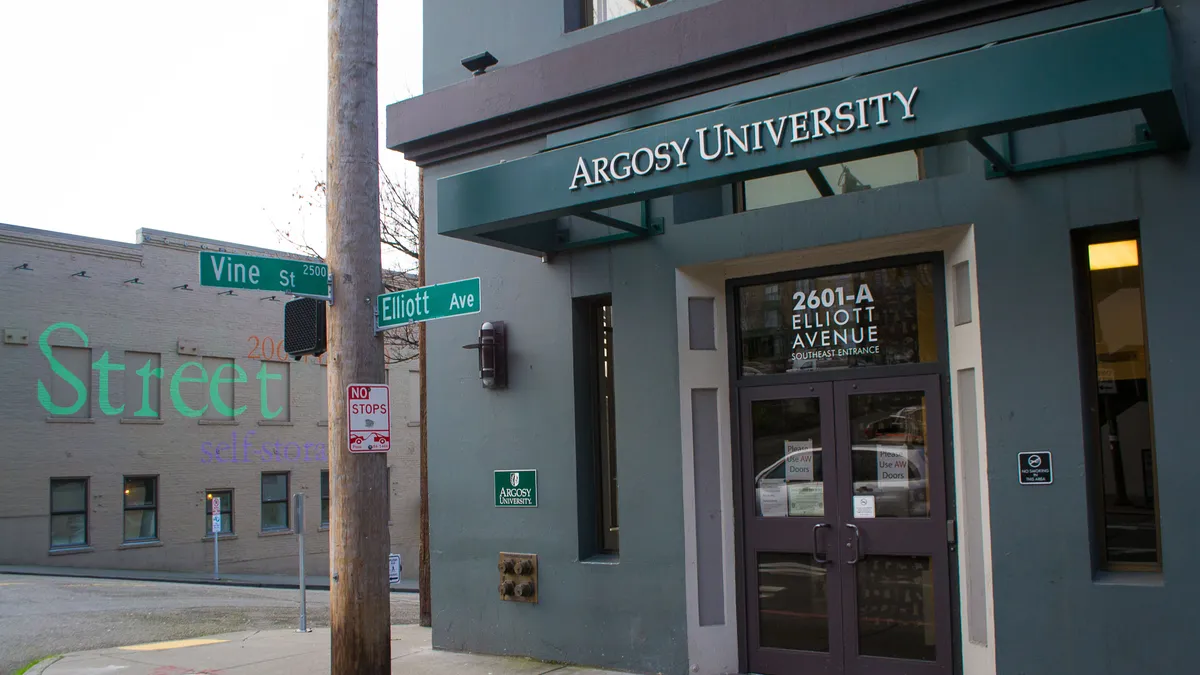Financially troubled Argosy University suffered a potentially fatal regulatory blow Wednesday, after months of owner Dream Center Education Holdings (DCEH) trying to sell off the college system.
The U.S. Department of Education blocked Argosy from access to further Title IV aid by denying its application for a change in control and its request to convert into a nonprofit. The department cited the failure of Argosy — which in January entered receivership along with other schools owned by DCEH — to meet financial and administrative standards.
The move only applies to Argosy, now under intense scrutiny for unpaid student aid refunds, which the department blamed on the receiver in a letter Wednesday. DCEH's other colleges are on the Heightened Cash Monitoring 2 system, meaning they cannot receive advanced Title IV funds. The organization owes its unsecured creditors more than $100 million, according to the department.
In a letter to DCEH's court-appointed receiver Mark Dottore and its Chairman Randall Barton, a department official faulted Dottore for not paying out Title IV stipends to students, including funds released just before and more than 10 days after Dottore was appointed as receiver on Jan. 18. The official called the alleged failure to pay students a "severe breach" of fiduciary standards, adding that it showed a "blatant disregard of the needs of (Argosy) students."
The department said it learned that Argosy had been locked out of its Phoenix campus location and had moved classes to another university's site, which it wasn't authorized by the Ed Department to do, while students lacked access to books, equipment and labs.
"We are disappointed at the decision by the Department of Education today to deny Argosy University’s request for change of ownership," Dottore said in an emailed statement. "We are working to determine the best path forward for students at this time."
Dottore was already trying to sell Argosy as well as the Art Institutes of Pittsburgh, Las Vegas and Seattle, but those institutions' fate remains uncertain.
Washington state's higher ed regulatory agency is holding information fairs for the roughly 650 students enrolled in the Art Institute of Seattle to discuss "next steps" in light of the college's risk of closure.
On a Feb. 21 conference call with state regulators, the Education Department indicated AI Seattle might run out of funds needed to operate, a Washington Student Achievement Council (WSAC) spokesperson told Education Dive in an email.
According to the state agency, AI Seattle has two options left: find a buyer or close. WSAC's notice to students follows court filings outlining the dire prospects of DCEH's remaining assets, which include AI Seattle.
'At further risk'
Dottore asked a federal court last week to return $6 million from a for-profit educational services company, Studio Enterprise Manager, contracted to provide services under a deal to spin off eight Art Institutes and most South University colleges. Dottore said the agreement allowed Studio to "strip DCEH of all its valuable business assets." Without the return of the money, all DCEH's remaining college systems would be forced to close, Dottore said in court papers.
Studio disputed Dottore's account of events, saying in a Tuesday court filing that "it is actually Mr. Dottore who has caused the fracturing of the universities' carefully negotiated reorganization plan — a reorganization plan in which Mr. Dottore was intimately involved in creating — and who is putting the long term viability of the universities at further risk."
According to Studio, the firm negotiated with DCEH to potentially acquire the Art Institutes. But the proposal "did not appear to be a priority for DCEH" as the organization, owned by the faith-based Dream Center Foundation, struggled with its hemorrhaging finances.
Dottore got involved in the negotiations in November. A deal was signed in January after much back-and-forth that included the Ed Department. Studio, however, says it was skeptical about various reorganization plans that included receivership and a sale of DCEH's Argosy University to an Ohio community college. Studio also said DCEH entered receivership without first notifying the firm, though it was required to in their agreements.
On Wednesday, Dottore settled the suit with Studio and Education Principle Foundation (EPF). Under the agreement, Studio will pay more than $2.7 million to the receiver and will direct another nearly $630,000 from South University owed to DCEH entities. Argosy will stop making payments to Studio, while Studio will retain right of first refusal to acquire Argosy or DCEH's remaining Art Institutes, excluding the Las Vegas, Seattle and Pittsburgh locations.
Deteriorating operations
Beyond the court tussles, pressure is mounting on DCEH, and Dottore. Argosy students are owed some $13 million in federal aid stipends. Additionally, some landlords have filed in court to have a say in the outcome of the receivership. The Art Institute of Las Vegas's landlord has asked the court to force DCEH to either start paying rent again or reject the lease and leave the property. Another landlord, who is owed nearly half a million dollars in rent, has argued that the receivership was never legally valid.
Rulings in the landlords' favor could be yet one more stressor on the organization's finances, which have already caused operational disruptions.
As one example, the vendor supplying DCEH with employee pharmacy benefits suspended service over financial concerns, according to a DCEH staff email Tuesday that Education Dive obtained. The Art Institute of Seattle has also experienced disruptions in digital textbook access through a vendor, according to an email sent to faculty earlier this month.
DCEH faced insolvency in the weeks and months leading up to receivership and the deal to transfer some of its remaining campuses to the nonprofit EPF. DCEH's acquisition of the Art Institutes, Argosy and South University in bankruptcy from the for-profit Education Management Corporation proved financially and legally precarious, almost from the beginning.
This article has been updated with new information about the receiver's settlement with Studio Enterprise Manager and Education Principle Foundation.





















